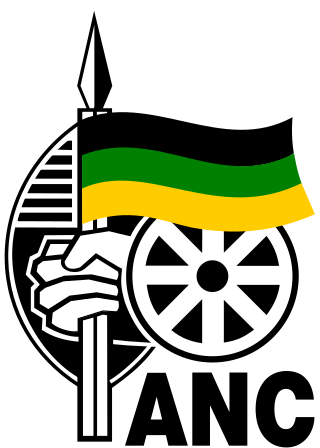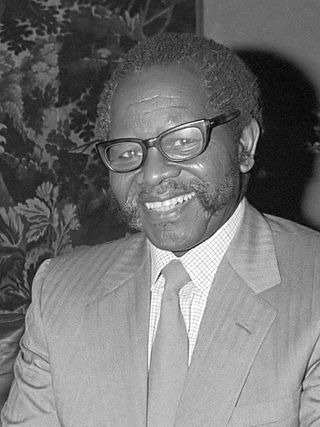
The African National Congress (ANC) is a political party in South Africa. It originated as a liberation movement known for its opposition to apartheid and has governed the country since 1994, when the first post-apartheid election resulted in Nelson Mandela being elected as President of South Africa. Cyril Ramaphosa, the incumbent national President, has served as President of the ANC since 18 December 2017.

Oliver Reginald Kaizana Tambo was a South African anti-apartheid politician and activist who served as President of the African National Congress (ANC) from 1967 to 1991.
Alex La Guma was a South African novelist, leader of the South African Coloured People's Organisation (SACPO) and a defendant in the Treason Trial, whose works helped characterise the movement against the apartheid era in South Africa. La Guma's vivid style, distinctive dialogue, and realistic, sympathetic portrayal of oppressed groups have made him one of the most notable South African writers of the 20th century. La Guma was awarded the 1969 Lotus Prize for Literature.

The apartheid system in South Africa was ended through a series of bilateral and multi-party negotiations between 1990 and 1993. The negotiations culminated in the passage of a new interim Constitution in 1993, a precursor to the Constitution of 1996; and in South Africa's first non-racial elections in 1994, won by the African National Congress (ANC) liberation movement.
The National Union of South African Students (NUSAS) was an important force for liberalism and later radicalism in South African student anti-apartheid politics. Its mottos included non-racialism and non-sexism.
ANC Today is a weekly web-based newsletter published by the African National Congress (ANC). It consists mainly of updates on current programmes and initiatives of the ANC.
The National Intelligence Service (NIS) was an intelligence agency of the Republic of South Africa that replaced the older Bureau of State Security (BOSS) in 1980. Associated with the Apartheid era in South Africa, it was replaced on 1 January 1995 by the South African Secret Service and the National Intelligence Agency with the passage of the Intelligence Act (1994).

Internal resistance to apartheid in South Africa originated from several independent sectors of South African society and took forms ranging from social movements and passive resistance to guerrilla warfare. Mass action against the ruling National Party (NP) government, coupled with South Africa's growing international isolation and economic sanctions, were instrumental in leading to negotiations to end apartheid, which began formally in 1990 and ended with South Africa's first multiracial elections under a universal franchise in 1994.

Endgame is a 2009 British film directed by Pete Travis from a script by Paula Milne, based upon the book The Fall of Apartheid by Robert Harvey. The film is produced by Daybreak Pictures and reunites Travis with Vantage Point actor William Hurt. It also stars Chiwetel Ejiofor, Jonny Lee Miller and Mark Strong. The film dramatises the final days of apartheid in South Africa. It was filmed at locations in Reading in England and Cape Town, South Africa in the first half of 2008 and was completed in December that year.
This article covers the history of the Pan Africanist Congress of Azania, once a South African liberation movement and now a minor political party.
Steve Vukhile Tshwete was a South African politician and activist with the African National Congress. Involved in Umkhonto we Sizwe, Tshwete was imprisoned by the apartheid authorities on Robben Island from February 1964 to 1978. Tshwete resumed activities with the ANC and become a regional coordinator for the new United Democratic Front. He later lived in exile in Zambia with the ANC. After the first free elections in South Africa in 1994, he became the new government's first Sports Minister and later was Minister of Safety and Security.
Martin Legassick (1940–2016) was a South African historian and Marxist activist. He died on 1 March 2016 after a battle with cancer. He was one of the central figures in the "revisionist" school of South African historiography that, drawing on Marxism, revolutionised the study of the social formation of Apartheid by highlighting the importance of political economy, class contradictions and imperialism. He was also a key figure in the independent left in South Africa from the 1970s, and a critic, from the left, of many of the analytical and strategic positions taken by the African National Congress and the South African Communist Party, as well as their understanding of South African history. The author of numerous books, mainly on the history of colonialism and capitalism, he collected many of his key political writings in his 2007 book Towards Socialist Democracy.
Willem Petrus "Willie" Esterhuyse, OLS is an emeritus professor of philosophy and business ethics at the University of Stellenbosch, a columnist and critic of the system of apartheid.
Anton Albert van Niekerk is a South African bioethicist and academic based at Stellenbosch University.
The Dakar Conference was a historic conference between members of the Institute for Democratic Alternatives in South Africa (IDASA) and the African National Congress (ANC). It was held in Dakar, Senegal between 9 and 12 July 1987. The conference discussed topics such as strategies for bringing fundamental change in South Africa, national unity, structures of the government and the future of the economy in a free South Africa. The IDASA delegation from South Africa, participated in the conference in their private capacity and would later be condemned by the South African government for meeting a banned organization. The future indirect result of the conference was South African government talks with Nelson Mandela and his eventual meeting with P. W. Botha in 1989.
Jack Simons was a South African university academic and anti-apartheid activist.

Sonia Bunting, OLS was a South African journalist, and a political and anti-apartheid activist. After being charged with treason and imprisoned, being detained a second time, and barred from publishing, she and her husband went into exile in London, where she joined the Anti-Apartheid Movement (AAM) and organised the World Campaign for the Release of South African Political Prisoners. When the African National Congress (ANC) ban was lifted in 1991, she returned to South Africa where she was involved in political activism until her death in 2001. She was posthumously honored by the government of South Africa with the Order of Luthuli in Silver in 2010.

Operation Vula was a secret domestic programme of the African National Congress (ANC) during the final years of apartheid in South Africa. Initiated in 1986 at the ANC headquarters in Lusaka and launched in South Africa in 1988, its operatives infiltrated weapons and banned ANC leaders into the country, in order to establish an underground network linking domestic activist structures with the ANC in exile. It was responsible for facilitating the only direct line of communication between ANC headquarters and Nelson Mandela, who at the time was imprisoned and was discussing a negotiated settlement with the government on the ANC's behalf. The operation was disbanded in 1990, after its existence had been publicly revealed and eight of its leaders charged under the Internal Security Act with terrorism and plotting an armed insurrection.

Zoliswa Albertina Kota-Mpeko is a South African politician from the Western Cape. A member of the African National Congress (ANC), she served as Deputy Minister of Human Settlements between May 2009 and May 2019. She served six terms in the National Assembly of South Africa.
Michael James Minaar Louw was a former Director-General of the South African National Intelligence Service (NIS) and after the 1994 South African elections, was appointed as head of the new South African Secret Service. He played a key role as a representative of the South African government in the secret negotiations held between them and the ANC in exile which brought about the unbanning of the latter in 1990 and the release of Nelson Mandela.






